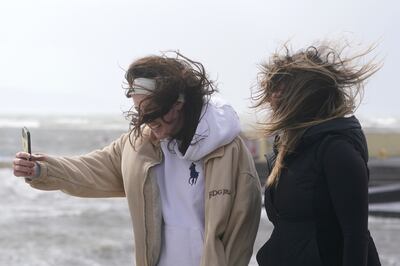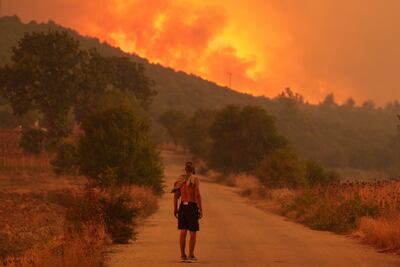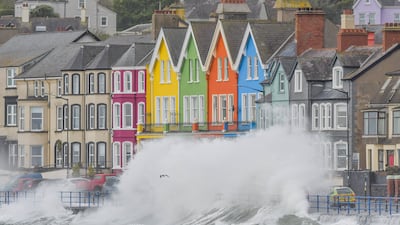The threat of power cuts and travel disruption has persisted in Scotland on Sunday as Storm Kathleen continues its journey across Ireland and the UK.
The Scottish Environmental Protection Agency (Sepa) has 18 regional flood alerts and 43 flood warnings in place in Scotland, which have been in place since Saturday.
The Met Office issued a new yellow wind warning, which came into force at 9am on Sunday, affecting parts of the east and northern Highlands, the Isle of Skye and the Hebrides. It will remain in force until 3pm local time.
Winds of 117kph were recorded in Drumalbin, South Lanarkshire.
The biggest impact on Sunday is expected in the Western Isles and Orkney.
"On top of already high tides, Kathleen will bring a storm surge and large waves. This combination is particularly dangerous, especially around high tides," Vincent Fitzsimons, Sepa's flood duty manager said.
"There is real danger to life from wave overtopping, particularly around causeways, coastal roads and paths.
"Disruption to travel and infrastructure is possible, as is isolated flooding to coastal properties and communities."

Scotland's ferry operator CalMac said on Sunday morning that it has cancelled all sailings on at least five different routes "in relation to strong winds".
In addition, all ferries to and from Liverpool, Heysham and Douglas on the Isle of Man have been cancelled until at least 3pm on Sunday, and ferries to and from the Isle of Wight also face some disruption.
ScotRail trains were going more slowly than usual due to the risk of high winds.
On Saturday, more than 140 flights throughout the UK were cancelled.
An Emirates Airbus A380 aircraft had to abandon its landing at Glasgow Airport twice on Saturday due to gale-force cross winds. Flight number EK27 was eventually forced to head south and land at London's Gatwick Airport.
In Ireland, about 34,000 people were left without electricity on Saturday.
While Storm Kathleen brought some blustery winds to south-east England, it also brought the warmest temperatures of the year so far.
Temperatures reached highs of 20.9ºC in Santon Downham in Suffolk on Saturday, beating this year’s previous record of 19.9ºC at Achfary in Sutherland in January.
Greece fire risk
Meanwhile, record temperatures and winds have also prompted authorities in Greece to issue wildfire warnings on Sunday.
Greece's civil protection ministry raised its wildfire alert level to "high risk", after dozens of blazes broke out.
On Saturday, "71 fires were declared in agricultural and forestry regions across the country in 12 hours", the ministry said.
Most of the fires were controlled, with the exception of one in Lasithi on the island of Crete that was still burning on Sunday, according to the local fire department.
Strong winds of up to 60kph are expected until Tuesday in several parts of Greece, "making the situation extremely dangerous for the outbreak of fires", the ministry said.

Greece recorded a record average temperature of 11.8ºC over the winter, according to the Athens Observatory, which has warned of a possible drought.
Temperatures have been unseasonably high since the start of April, reaching 31ºC last Tuesday at Chania on Crete.
Like much of the Mediterranean last summer, Greece was hit by a prolonged heatwave which triggered a number of wildfires, killing 20 people and damaging close to 175,000 hectares of land.


